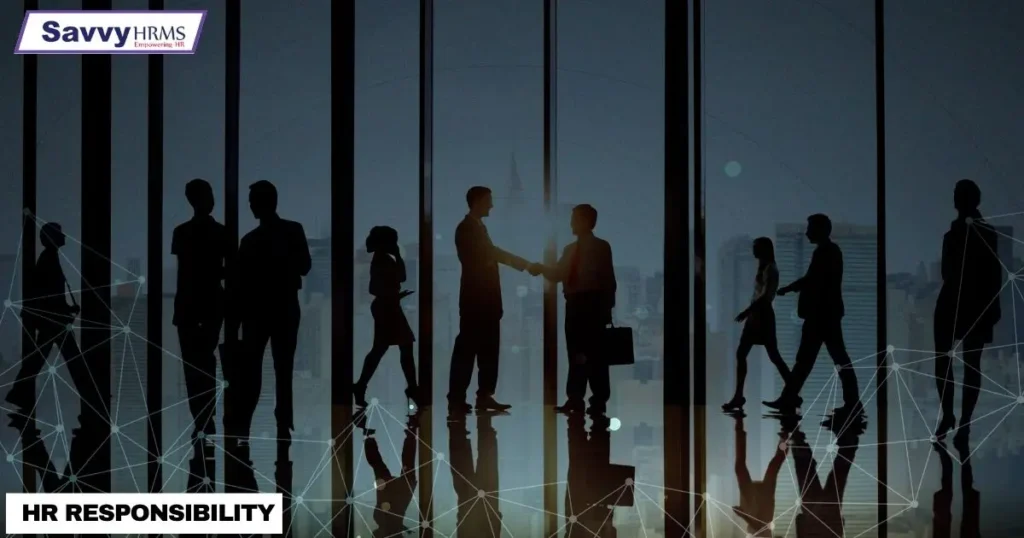Have you ever thought about what keeps the wheels greased in a seamless & efficient organisation? This is neither a strategy nor technology; it is the human resource! And HR responsibility is at the core of that.
Employment and talent acquisition are integral to practically every aspect of an organisation’s growth (e.g., talent culture, workplace culture, training, etc.). What does HR’s responsibility look like in an environment of constant uncertainty?
Let’s look at what HR responsibility looks like in today’s organisations.
What is an HR Responsibility?
HR responsibility encompasses the essential functions and duties of the human resources department. It can cover the continuum of recruitment/selection/induction aspects. Enforce policies outlined in employee handbooks and applicable legislation. Engaging the workforce in a multitude of processes.
Core Areas of HR Responsibility
1. Recruitment and Selection
Drawing up job descriptions, placing ads, screening candidates & interviewing. Then, finalizing the best-fit candidate comes under recruitment and selection.
Why it matters: Hires are better at being productive & resources who hold to function.
2. Employee Onboarding and Orientation
Once someone is hired, the employee must be ushered through the end of the hiring process. HR explains policies, tools & provides for interests to ensure a seamless settling.
Why it matters: The better the new hire settles in, the faster the productivity starts.
3. Payroll Management
Payroll encompasses everything from processing payroll in a timely manner, taking deductions, calculating bonuses to reimbursements, and more. It is HR’s responsibility to ensure employees are paid properly and on time.
Why it matters: Running payroll timely builds trust with employees and is legally required.
4. Performance Management
This deals with setting up systems that promote and regulate employee performance. It carries the responsibility for setting up mechanisms. Through this, the performance of employees in an organization is regularly assessed!
Why it matters: Feedback improves the development rate of the employee & enhances satisfaction.
5. Learning and Development
The training enables employees to develop in their respective careers. HR seeks to identify gaps & introduce upskilling programs to optimize the output.
Why it matters: Skills are the key to work output.
6. Compensation and Benefits
HR must deliberate on fair pay practices, awarding bonuses & imposing certain leave. Transparency and compliance with labor laws are a must.
Why it matters: Fair compensation will satisfy employees who will be loyal.
7. Policy Creation and Implementation
HR staff frame internal policies and see to it that all departments follow such policies, such as leave policies, work ethics, safety, and the code of conduct.
Why it matters: Policies provide structure and discipline.
8. Conflict Resolution
Disagreements are bound to happen in any workplace. HR is the most appropriate department to listen to, mediate & resolve such conflicts. Thus maintaining neutrality.
Why it matters: Disruptions will be fewer in a healthy workplace.
9. Employee Engagement and Retention
Planning events to get employee feedback & ensuring mental well-being are incumbencies of HR. Engaged employees are likely to stay longer and perform better.
Why it matters: Engaged teams perform better.
Why It Matters to Know About HR Responsibility
HR responsibilities are changing as the world of work changes. HR is no longer just about paper and policies. Yes, it’s about supporting people. It’s about value to the business. Yes, it’s about sustainable work environments. With the Savvy HRMS system, we can automate 99% of these HR responsibilities and minimise human error. Allowing you or HR professionals to come back on track.
Conclusion
HR has moved well beyond being simply a support function. It is now a strategic partner, a team builder, and a method of future-proofing an organisation. Understanding the vast nature of HR’s remit and how it can empower teams will place the organisation in a position for continual growth.
Want to Level Up Your HR Work?
Looking to make HR tasks simpler and more productive? Savvy HRMS provides smarter, automated solutions that will manage every aspect of HR responsibility, from recruitment to retention. Leave behind manual mistakes and create a seamless HR function.
Check out Savvy HRMS today- the new standard in humanity and HR.
FAQs
Q1 What are the HR responsibilities?
Through recruitment, onboarding, performance management, training, payroll, and conflicts.
Q2. Why is HR important in an organisation?
HR is important because it ensures everything runs smoothly and on track. Ensures employee comfort and satisfaction, as well as helping to achieve business milestones.
Q3. How do HR Responsibilities impact the culture in the organisation?
HR policies and employee engagement activities help to define employer and management perceptions. Thus creating a positive workplace culture.
Q4. Can HR responsibilities be automated?
YES! Using excellent software like Savvy HRMS can be managed in an automated way. Hence, it helps you to manage attendance, payroll, and employee files etc.
Q5. What types of skills does one need in order to be effective with HR responsibility?
Communication, problem solving, knowledge of legal issues regarding employment, empathy, and hr technology skills.




